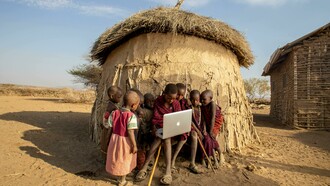Human history began the moment the first recorded hominid, known to scientists as Australopithecus anamnesis, stood on two feet and began to walk. This happened about four million years ago, and it seems that our ancestor was a relative of the famous grandmother Lucy, whose remains rest in the Addis Ababa Museum in Ethiopia. It all began in Africa, a continent rich not only for paleontologists but also for those who exploited its natural and human resources, as recorded in the history of its inhabitants, who were scattered throughout the world as slaves. Since man began to walk, two constants have accompanied our evolution: emigration and war. The march has never stopped, and thanks to it, the continents have been populated, human groups have been mixed, organised into clans, tribes and communities, giving rise to different types of societies and forms of political organisation, up to the creation of States.
Likewise, from the very beginning, humans learned to defend themselves and to kill wild animals, first to survive and then to hunt them for food. And of course, with the first weapons, he quickly learned to subdue and/or eliminate his fellow men. Thus, wars became a part of life. The marches of women, men, and children that we see today walking from Africa to Europe, or from Mexico to the United States, or from Venezuela to the South, are not very different from what our distant ancestors did in search of safety or food. Nor are the wars of all kinds that ravage part of our planet today: in Eastern Europe, in the Middle East, or in Africa. In the Americas, conventional wars have been left behind, and if we disregard the U.S. military interventions in Latin America—or the bloody coups d'état in the region—the last three were fought in the 20th century, between Paraguay and Bolivia (1932-1935), the Argentine military dictatorship and the British colonial power in the Falkland Islands (1982), and between Peru and Ecuador (1995).
Civilised Europe, on the other hand, has not ceased to cultivate its centuries-old innate militarism. Wars between neighbouring countries have marked the past and present of the continent and of humanity, leaving the largest number of civilian and military victims in history. From the point of view of time, periods of peace in Europe have been short-lived. It is enough to recall the 20th century, with its two world wars, started and lost by Germany, which left millions dead, destruction, a new world order and the creation of two military blocs, of which only one remains today: NATO, which continues to expand, seeking new members not only in Europe but also in the Asia-Pacific region, thereby encouraging the underlying Japanese militarism. And just when it was thought that Europe had seen no more wars in the 20th century, in 1999 NATO, in violation of all the norms of international law, attacked Yugoslavia, a country emerging from a civil war, and ended up splitting it into six states, leaving thousands of civilians dead and creating a situation of insecurity in Bosnia that continues to this day.
Just two decades into the 21st century, which began with great hopes—as it did in 1900—with the fall of the Berlin Wall, the disappearance of the Soviet Union, the expansion of democratic systems, globalisation, the United Nations' 17 Sustainable Development Goals, the processes of political and economic integration in Latin America, and many other promises of good intentions, much of it has now come to nothing. The European theatre of war is more active than ever because of the confrontation between Russia and Ukraine, which, more than the fear of a hypothetical return of the Russians to Berlin, has awakened the militaristic unconscious that does not abandon Europe, stimulated by the hegemonic vision of global control that the United States wants to impose, driven by the military-industrial complex that generates millions of jobs and billions of euros in profits. If in the second half of the twentieth century the Western countries were afraid of the Soviet Union, today NATO, always led by an American general and with a European politician acting as its spokesman, has declared China to be the main threat because of its various strengths, such as the strength of its economy, its population, its undoubted technological advances and its military power, among others.
Then there is the one-party political system, or dictatorship, which seems to be typical of its millennia-old cultural development. They are not heirs to the Western cultural and political tradition, which has its roots in Greece and Rome, so they have never known democracy or freedom of the press, but they have known poverty, hunger, humiliation, and colonial subjugation by Europeans and Japanese. The question seems to be what to do with China, and Washington's answer is clear: weaken and isolate it. For the conservative sectors of the U.S. and some European stalwarts, what should be done is to break its political unity and distance it from its allies, mainly from Moscow, just as the Russian Federation is being dismembered.
Some experts recall that this was the vision of President Nixon and Kissinger when, in 1972, because of the ideological clashes between Beijing and Moscow, the U.S. president travelled to meet Mao Zedong on the old principle of 'the enemy of my enemy is my friend', thus laying the foundations for diplomatic recognition. Just as the Chinese had no problem establishing relations with the 'paper tiger', neither did the Americans, who put what they considered to be the national interest of the United States first. The Nixon-Kissinger duo had no hesitation in abandoning Taiwan, recognising the existence of a unitary China and legitimising the Communist People's Republic of China, leaving their European allies and NATO itself perplexed.
Faced the possibility of a new U.S. administration led by Donald Trump, who has already announced that he wants to end the war in Eastern Europe, could surprise the world with a new concept of international order. He has never hidden his good relations with Vladimir Putin and has pointed out that if he had been in the White House, Russia would never have invaded Ukraine. The dilemma will be for the countries that make up the European Union, where although all its members are relevant, France and Germany are leading the way and both countries are facing a strong challenge to their policies.
The long history of rivalries and confrontations between European countries has shown the fragility of alliances, and although the European Union seeks to strengthen a common identity, the cultural weight of each of its members is very different and has been fed by massive migratory flows that have brought linguistic, ethnic and religious diversity, with the rest of the Balkan region of southern Europe, including Muslim countries such as Albania, Kosovo and Bosnia-Herzegovina, which are waiting to become full members, still to be incorporated. It has yet to include its staunch military ally, Turkey, now a middle power with a strategic position and imperial pedigree, whose accession negotiations, begun in 2005, are currently at a standstill. The obvious question is whether Europe will be able to sustain a common policy in the face of such diversity.
We are entering an era full of uncertainties and an incredible lack of political leadership, of true statesmen capable of maintaining a medium- and long-term vision to face the obvious threats to the planet caused by global warming, the migratory crisis that crosses borders and will tend to get worse due to the growth of the seas or the lack of water in many regions, together with demographic growth and an international system such as the United Nations that is paralysed, incapable of imposing measures or stopping wars. The best proof of what we are experiencing is the behaviour of the Israeli government, which violates the elementary principles of international law with impunity.
The same is true of Russia in Ukraine, which has violated internationally recognized borders. Added to this is the new wave of protectionist measures, with the unilateral imposition of tariffs on trade between powers, which only aggravates the situation by generating more instability and further weakening the multilateral system, which is losing legitimacy by the day and could lead to a real war between countries with nuclear power. For all these reasons, the eyes of the world will be on the presidential elections in the United States on 5 November, and whoever wins will have to find answers to the global problems that threaten peace and the very existence of humanity.
All wars come to an end, such as the 100-year European wars between the English and the French, or the 30-year war that engulfed Central Europe, or the thousand-year war between the Chinese and the Vietnamese. Long wars, such as the Napoleonic Wars or the First and Second World Wars, gave rise to the Congress of Vienna, the League of Nations and the United States. Nations, respectively, generating a new international order for each period. And while some wars end, others begin under the most varied of justifications, which are usually not lacking. Imperialist ambitions are not the heritage of a single power, but of several, be they large, medium or small.
Man's desire for power, or his quest for power, never seems to be satisfied, and this is the cause of aggression, invasion, or attack. The results of wars will always be uncertain, since they will ultimately be expressed in the alteration of borders, military occupations, expulsions of populations, subjugations, the disappearance of countries, the emergence of new states, the annexation of territories, economic reparations, or payments for damages caused, and many other consequences, such as wounds that last for generations, with only one thing in common: destruction, death, and human suffering. But while the dead of most wars so far could be counted, those of the next one will probably have no one to count them.















